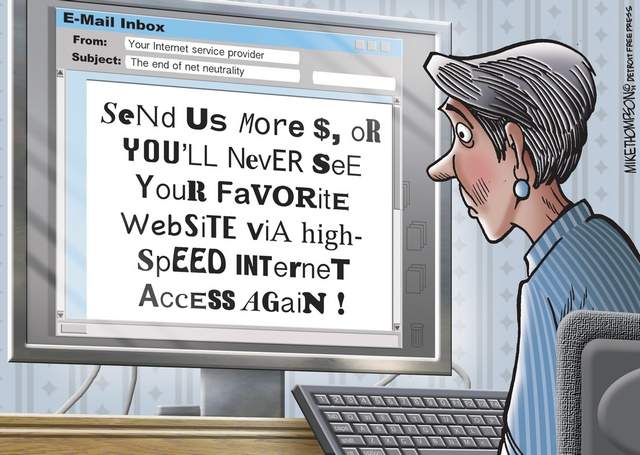I know the last few posts on this blog have been a bit on the bleak side, so I'm glad to write this post about the FCC's decision to finally list the internet as a public utility. This after the FCC received over three million complaints over Comcast's attempt to implement a program that would intstitute "fast lanes" where clients who paid more had faster access to certain sites, and "slow lanes" where costumers who did not pay this extra fee would have certain sites throlled (lower bandwith). This model is very similar to the cable and satellite TV model, where access to sites is regulated by payment (though it was never particularly clear if you would be required to pay for access to certain sites, or if it simply throttled access to these sites).
Though Comcast does not claim to throttle access to sites currently, it has charged streaming sites, most notably Netflix, for the high data usage the site requires. This fee that Comcast pays out (or at this point paid out) was followed by a slow down in access to Netflix via Comast from when the payment was requested and spiked again after Netflix agreed to pay (see graph below).
Much like radio, this decision heavily regulates access to, and usage one has, when using internet infrastructure (phone lines, fibre optic cables, etc.). For those living in major metropolitan areas, this lack of regulation has lead to "provider zones" where living in a certain area forces the use of one ISP or another, with Comcast, Time Warner and AT&T U-Verse. This, along with the largest ISPs agreeing not to extend into each other's "provider zones", has resulted in higher prices, decreased competition and on a global scale, some of the slowest internet in the developed world.
The following quote from the New York Times puts it quite succinctly:
"The reason the United States lags many countries in both speed and affordability, according to people who study the issue, has nothing to do with technology. Instead, it is an economic policy problem — the lack of competition in the broadband industry.
“It’s just very simple economics,” said Tim Wu, a professor at Columbia Law School who studies antitrust and communications and was an adviser to the Federal Trade Commission. “The average market has one or two serious Internet providers, and they set their prices at monopoly or duopoly pricing.”
For relatively high-speed Internet at 25 megabits per second, 75 percent of homes have one option at most, according to the Federal Communications Commission — usually Comcast, Time Warner, AT&T or Verizon. It’s an issue anyone who has shopped for Internet knows well, and it is even worse for people who live in rural areas. It matters not just for entertainment; an Internet connection is necessary for people to find and perform jobs, and to do new things in areas like medicine and education."
This newly passed legislation both serves to limit the extend ISPs can throttle and serves to break up the hold major ISPs have on the market. It's no surprise than that giants like Google, as it attempts to implement its Google Fiber service, and Netflix, in suffering directly from this model, heavily support this FCC decision.
With the internet playing such a vital role in the days to day lives of adults everywhere, it seems very difficult to justify the stifling of an essential public resource to create an atmosphere of artificial scarcity. Pushing back the development of an incredibly important piece of infrastructure to make a quick buck can only serve the hurt both national and global development in a nation where 74.4% of citizens report having direct access to the internet at home. Although I often feel regulatory agencies fail to well, regulate in an effective manner, this decision marks a step in the right direction both for the everyday consumer and serves as an important example of the government working for the people, not against them.


This post reminds me of my recent joy over the fact that Comcast and Time Warner Cable didn't end up merging- cable monopolies are possibly the worst thing that could happen to the media industry. I hope that over time legislation is passed which essentially looks at Internet access as a fundamental human right that cannot be taken by companies that are attempting to form duopolies, as you said, over the Internet. Microfinance work has shown that even by giving small communities in developing countries Internet access, the entire economy can develop. Net neutrality is directly related to economic success and I hope that this is a direction that our nation continues to move toward moving forward.
ReplyDeleteHey, there is a broken link in this article, under the anchor text - 74.4% of citizens report having direct access to the internet at home
ReplyDeleteHere is the working link so you can replace it - https://selectra.co.uk/sites/selectra.co.uk/files/pdf/computerandinternetuse.pdf